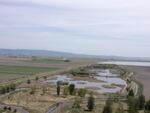
Wildlife refuges in the Klamath Basin often feature a mixture of commercial agriculture and what remains of the historic wetlands.
President Trump on Tuesday issued an executive order that will start to rollback clean water rules. In the Northwest, environmentalists say that could be bad news for threatened and endangered salmon and steelhead. Farm and industry groups are lauding the order.
Advocates say the rule protects countless headwater streams and wetlands in the Pacific Northwest; if ununprotected they could eventually be developed with roads, housing, or more logging operations.
"Weakening America's laws that protect clean water is wrong," said Brett VandenHeuvel, executive director of Columbia Riverkeeper. "The executive order could potentially remove the protections of our headwater streams and wetlands that we rely on for clean drinking water and wildlife habitat."
But the Obama-era rule — commonly known as the Waters of the United States rule — has created controversy among groups like the American Farm Bureau.
"The [Waters of the United States] rule would've expanded federal government control over private property, including ditches, ephemerals, small ponds, and even dry farmland. Farmers and ranchers would've had to apply for a costly permit to do even basic work on their land or be at risk for enormous fines and lawsuits," said Barry Bushue, Oregon Farm Bureau president.
President Obama signed the clean water rule in 2015 in an attempt to clarify uncertainty about who can regulate smaller streams and wetlands. The U.S. Environmental Protection Agency originally said the rule would help limit pollution in these waterbodies.
But the rule never went into effect. It was challenged in a multi-state lawsuit led by Scott Pruitt, who then served as Oklahoma's attorney general and now heads the EPA. Many who oppose the rule say it's an overreach by the EPA.
"Every day farmers and ranchers work very hard to conserve water and protect water quality because their livelihood depends on it, and it's the right thing to do," Bushue said in a statement. "The EPA's attempt at jurisdictional overreach would have been devastating to family agriculture in Oregon."
Conservation groups in the Northwest worry that rolling back the regulations could harm fish -- and that would eventually hurt wildlife that rely on fish for food. Lisa Pelly is Trout Unlimited's Washington Water Project director.
"This rollback really affects a lot of the tributaries and streams where, not only people get water to drink, but where a lot of fish species live and grow before they go out to Puget Sound or the ocean or the Columbia River," Pelly said.
Pelly said it's frustrating that "broad strokes of the pen" can lead to big changes without much discussion.
This executive order will not immediately eliminate Obama's clean water rule.
On Twitter, the executive director for the Center for Biological Diversity has already threatened a lawsuit.
“Trump just put millions of acres of wetlands on the chopping block." But @CenterForBioDiv will sue to stop trump. https://t.co/vNZBuXPDFq
— Kierán Suckling (@KieranSuckling) February 28, 2017
“‘Trump just put millions of acres of wetlands on the chopping block.’ But @CenterForBioDiv will sue to stop trump,” Kierán Suckling tweeted.
